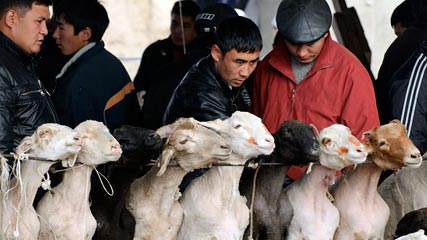It’s another bayram, Festival of Sacrifice, at my favorite Istanbul landmark, Süleymaniye Mosque.

This year, it’s a more special day for the city; because the renovation of the mosque has been finally completed after three years. Until today, I have been guiding several of my foreign friends to Süleymaniye, only to show the exterior of the mosque and a small portion of the interior. As the renovation, which is the most comprehensive in 457-year old history of the mosque, is completed now, Süleymaniye is once again a must-see landmark for all tourists.
Süleymaniye is a massive symbol of humbleness and it is not a contradiction.
Sinan the Great Architect built this temple in the reign of Süleyman the Magnificent. The construction was completed a bit later than it was planned. So the great Ottoman sultan was initially angry. One day, he went to the construction site and saw Sinan, smoking a water pipe beneath the huge dome. He lost his temper, asked Sinan why he was enjoying his time while the mosque was still not completed. Sinan was calm. “I’m testing the acoustics, my sultan,” he said, signaling another instance of his genius.
The sultan cooled down, but he got angry again when he learned that the Shah of Persia had sent some diamonds as a contribution to the slowed-down construction. It was a clever insult from the Shah. So the Sultan crushed all the diamonds of Shah and put them into the cement of the mosque. They say that this is why one of the minarets of the mosque still shines during sunsets.
Such anecdotes about a unique civilization can make a person feel good, whether he sees these buildings as houses of God or just human-made architectural structures. Today’s Europe should comprehend it as well. Losing ancient landmarks, mosques or churches or aqueducts, is a loss for humanity; because they all have such stories, history. Since Andalusia and Ottoman, Islam belonged to Europe, too, as German President Christian Wulff has recently observed.
On the other hand, as I’ve written before, there are no mosques anymore in Athens, the Greek capital which was an Ottoman city for centuries. Festival of Sacrifice is not a day to make any kind of criticism, so I won’t criticize the Greek politicians who demolished the Ottoman heritage in the past. However, it is a good time to say something about the future.
How come can the Greek government still ban the construction of mosques in Athens? Why does the European Union let them to do so? Would Brussels agree the full membership of another Turkey that would demolish all churches and ban their construction?
Egemen Bagis, Turkey’s EU negotiator, was in the European Parliament today to accept a prize for his government’s performance on expanding religious freedom. As you know, I dislike his Islamist government, but Bagis pointed out the right direction in the right time. He said that he was in Athens the previous day and he added: “I had to come to Brussels earlier, in order to participate in the bayram prayer in a mosque here. Why? Because in Athens, they don’t have a mosque and thousands of Muslims pray in the streets.”
All in all, if the European Union insists to remain as a Christian club, we will all see that it will not be European, nor union anymore. The first quality requires you to be civilized and the second one requires you to be tolerant.
via The Istanbulian: Istanbul’s Grand Mosque and Mosque-Free Athens.





